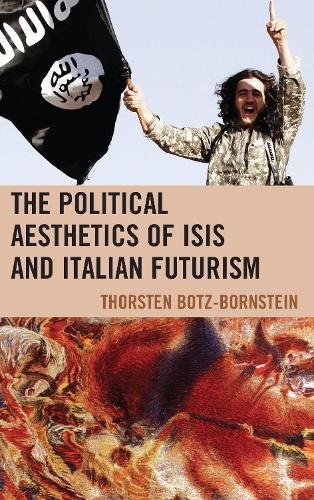
The Political Aesthetics of ISIS and Italian Futurism
(Hardback)
Publishing Details
The Political Aesthetics of ISIS and Italian Futurism
By (Author) Thorsten Botz-Bornstein
Bloomsbury Publishing PLC
Lexington Books
17th December 2018
United States
Classifications
Professional and Scholarly
Non Fiction
Terrorism, armed struggle
Social forecasting, future studies
Political control and freedoms
Politics and government
320.01
Physical Properties
Hardback
228
Width 154mm, Height 239mm, Spine 22mm
494g
Description
Through empirical analysis and theoretical reflection, this book shows that the aesthetics and politics of the Islamic State is futurist. ISIS overcomes postmodern pessimism and joins the modern, techno-oriented, and optimistic attitude propagated by Italian Futurism in the early twentieth century. The Islamic State does not only excel through the extensive use of high-tech weapons, social media, commercial bot, and automated text systems. By putting forward the presence of speeding cars and tanks, mobile phones, and computers, ISIS presents jihad life as connected to modern urban culture. Futurism praised violence as a means of leaving behind imitations of the past in order to project itself most efficiently into the future. A profound sense of crisis produces in both Futurism and jihadism a nihilistic attitude toward the present state of society that will be overcome through an exaltation of technology. Futurists were opposed to parliamentary democracy and sympathized with nationalism and colonialism. ISIS jihadism suggests a similarly curious combination of modernism and conservative values. The most obvious modern characteristic of this new image of fundamentalism is the highly aestheticized recruiting material.
Reviews
Joyfully tearing down the compartment walls that conventionally separate fascist studies from research into jihadism, and gleefully crossing the boundaries between aesthetics and politics, Botz-Bornstein challenges, or rather provokes, the reader to reconfigure the space that fascist and terrorist destructiveness occupy in the contemporary media, party-political and historical imaginations. Not afraid to alienate experts in both fields of study, his book creates new connections and suggests fresh juxtapositions with futurist abandon. Though the ludic may prevail over the academic, The Political Aesthetics of ISIS and Italian Futurism exposes the veins of a perversely politicized brand of modernism that throb just under the surface of two ideologies that claim to be rooted in an imperial or religious tradition, and which expresses itself in deliberately staged acts of spectacularly aestheticized destruction. -- Roger Griffin, Oxford Brookes University
Author Bio
Thorsten Botz-Bornstein is associate professor of philosophy at Gulf University for Science and Technology.
